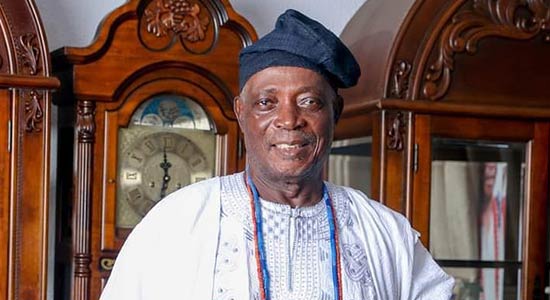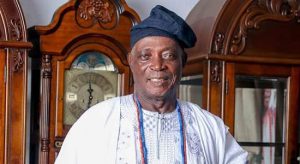NEWS
Olubadan: Ladoja Awaits Makinde’s Nod After Council Nomination

Olubadan: Ladoja Awaits Makinde’s Nod After Council Nomination

The Olubadan Chieftaincy System: A Tradition of Merit and Patience
The Olubadan system is unlike many traditional institutions across Africa. It operates a unique linear succession structure where two lines—the civil and military—run parallel. As one chief exits, the next senior in line moves up until eventually reaching the Olubadan throne. This time-honored tradition is regarded as one of the most orderly monarchical systems in the world.
High Chief Rashidi Ladoja has patiently risen through the civil line of succession and now stands at the pinnacle, following the recent demise of the late Olubadan, Oba Lekan Balogun. His nomination is a recognition of decades-long service and participation in the Ibadan traditional structure.
Political Weight and Cultural Significance
Ladoja’s potential coronation is of great significance not only to the traditional council but also to the political elite. As a former governor, senator, and national figure, Ladoja carries immense political weight. His ascension would bridge political influence with traditional authority—an intersection not unfamiliar in Yoruba leadership history.
Observers say his reign could mark a renewed era of development-minded monarchy in Ibadanland, given his track record in governance, business acumen, and conflict resolution.
Awaiting Governor Seyi Makinde’s Final Endorsement
Under the Oyo State Chieftaincy Laws, the final step in the enthronement of a new Olubadan rests with the State Governor. As of now, Governor Seyi Makinde has received the official documentation from the Olubadan-in-Council, formally nominating Ladoja.
While the governor is yet to issue a public statement or sign off on the nomination, sources close to the government hint that the endorsement is merely a matter of time. However, with political undercurrents in Oyo State never far beneath the surface, Nigeria Communications Week
FCMB Group Delivers Strong H1 2025 Results with ₦79.3bn Profit …
The Intricacies of Tradition and Reform
It should be recalled that in 2017, during the tenure of Governor Abiola Ajimobi, the Ibadan chieftaincy system was subjected to reforms that altered titles and succession hierarchies—moves which Ladoja fiercely opposed. Legal battles ensued, and the issue became deeply politicized.
With Makinde now at the helm and Ladoja standing as the most senior high chief, the political air is more harmonious. Analysts believe that Makinde’s eventual approval will not only reflect a commitment to peace and continuity but also serve to heal prior frictions within the traditional council.
Voices from the Royal Council
Several members of the Olubadan-in-Council have expressed support for Ladoja’s emergence. According to High Chief Eddy Oyewole, “There is no controversy about the next Olubadan. High Chief Ladoja is the most senior and eminently qualified by tradition. We are only waiting for the governor’s assent.”
Other traditional chiefs have echoed similar sentiments, highlighting Ladoja’s contributions to Ibadanland, both in his capacity as a traditional title holder and as a state leader.
Ibadan Indigenes React
Across the length and breadth of Ibadan, the mood is one of subdued anticipation. Market women, students, elders, and youths have begun informal discussions on the prospects of Ladoja’s reign. Social media is abuzz with messages of support and prayers for a peaceful coronation.
A local trader at the popular Bodija Market said, “We are proud of Baba Ladoja. He has served us in politics and in the palace. We believe he will be a father to all as Olubadan.”
A New Era in Ibadan History
If confirmed, Rashidi Ladoja will be stepping into a role that transcends ceremonial tradition. The Olubadan is the custodian of Ibadan’s heritage, its values, and its collective wisdom. Ladoja’s reign could usher in a fresh era of development, reconciliation, and global recognition for Ibadanland.
Known for his diplomatic style, Ladoja is expected to bring together various interest groups, facilitate inter-generational dialogue, and preserve the cultural ethos of one of Nigeria’s oldest and largest cities.
Tradition Meets Modernity
Ladoja’s transition from politician to monarch will be closely watched as a test case of tradition meeting modern governance principles. Many believe he is well-suited to blend cultural leadership with contemporary development strategies.
Experts note that the Olubadan stool can serve as a soft power vehicle for regional advocacy, educational reform, and cultural tourism—a vision many believe Ladoja can champion effectively.
Security and Logistics for Coronation
Meanwhile, the Ibadan Traditional Council has begun preliminary arrangements for a grand coronation ceremony, subject to the governor’s approval. Security agencies, traditional performers, and dignitaries from across Nigeria and the diaspora are expected to attend.
Sources say Mapo Hall, the iconic hilltop center of power in Ibadan, has been earmarked for the official installation. Cultural troupes are already rehearsing for what is expected to be a historic celebration.
What This Means for Yoruba Royal Institutions
Ladoja’s emergence is significant beyond Ibadan. As a highly educated and politically experienced leader, his reign could influence broader discussions about the modernization of Yoruba royalty, traditional council roles, and youth engagement in cultural preservation.
Traditional rulers across Yoruba land, including the Ooni of Ife and the Alaafin line, are expected to engage closely with the new Olubadan on regional unity, security, and economic empowerment.
Final Thoughts: All Eyes on Makinde
With all eyes now on Governor Seyi Makinde, the state awaits the final proclamation that will confirm Rashidi Ladoja’s ascension to the Olubadan throne. Supporters, traditionalists, and political stakeholders alike are optimistic that the governor will uphold tradition and allow history to take its natural course.
In a city where tradition is held sacred and identity is deeply rooted in royal succession, this moment stands as a bridge between the past and the future—one that will be remembered for generations to come.

